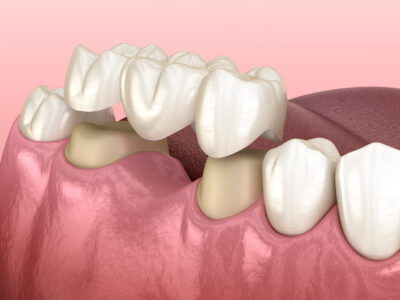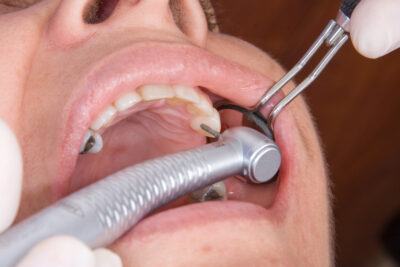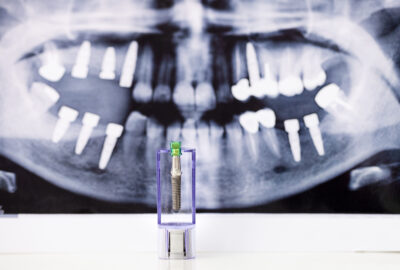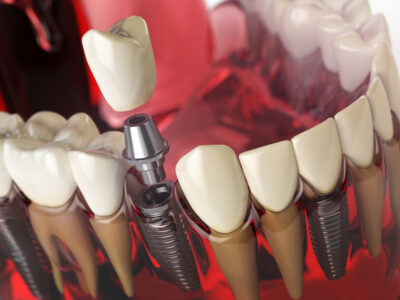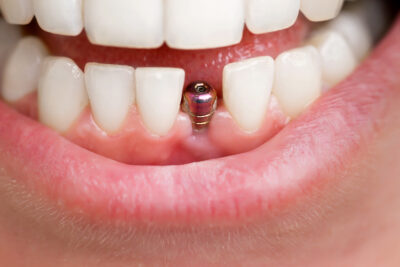
Requiring a tooth replacement is not as uncommon as many patients think. Even with proper care, most Americans need to replace one or more teeth at some point in their lives. In fact, according to statistics from the American Association of Oral and Maxillofacial Surgeons, 69% of people ages 35 to 44 have lost at least one permanent adult tooth due to an accident, gum disease, a failed root canal, or tooth decay, and by age 74. Additionally, 26% of adults have lost all their permanent adult teeth.
However, if you are concerned about a lost tooth and don’t want to spend a lifetime wearing false teeth or partial dentures, the good news is that there are now a range of other tooth replacement options. In addition, the two of the most common options are dental bridges and dental implants.
Table of Contents
What is a Dental Bridge?
What Are the Pros of Dental Bridges?
What is a Dental Implant?
How Long Does a Dental Implant Last?
What Are the Pros of Dental Implants?
Find a Solution with Our Bay Area Dental Specialists
Dental Bridge vs Implant –What’s the Best Option?
A dental bridge and dental implant are approved treatments by the American Dental Association. They can enhance your natural appearance with an artificial tooth (or artificial teeth) designed to look like your natural teeth. Both of these tooth replacement procedures do not require invasive surgery and can last for years.
However, whether a dental bridge vs. implant is the best option for you requires some insight. Dental bridges and dental implants have their own sets of benefits and drawbacks. Therefore, you’ll want to carefully consider which option is best suited for your oral health – both now and in the future.
Your dental professional can thoroughly review the pros and cons of a dental bridge vs. implant with you at your primary consultation at the dentist’s office to ensure you move forward with confidence.
In the meantime, however, it’s helpful to understand the differences between dental implants and dental bridges, including what each tooth replacement procedure involves and what you can expect immediately afterward and for many years to come.
Dental Bridges
What is a Dental Bridge?
As the name implies, a dental bridge effectively “bridges” the gap between one or more missing teeth and your adjacent natural teeth via an artificial tooth with metal or porcelain wings, also known as crowns.
The dental bridge procedure involves placing the artificial tooth onto the gum line and permanently affixing the crowns or porcelain wings on the adjacent teeth to support the artificial tooth and hold it in place. (This type of dental bridge is also known as a traditional bridge, and it’s the most common type of bridge vs. other dental bridge options, like a Cantilever Dental Bridge or Implant-Supported Bridge.)
The artificial tooth and the crowns that go over the neighboring teeth (or abutment teeth) generally have a porcelain framework. However, artificial teeth can also be made of gold, alloys, or a combination of these materials.
The replacement tooth and adjacent crowns are cemented onto the remaining teeth. In addition, while oral surgery is not generally required, your dental professional or oral surgeon may need to remove some tooth enamel from the supporting teeth to ensure a proper dental bridge placement.
How Long Does a Dental Bridge Procedure Take?
A dental bridge procedure typically takes only two visits to your dental professional for the proper replacement of your teeth.
At the first appointment, your dentist will prepare your teeth for the dental bridge procedure, typically by filing down the teeth surrounding the missing tooth to make room for the new replacement tooth. Impressions will also be taken for your new dental bridge, and a temporary dental bridge or partial dentures may be worn in the interim. At your second appointment, your custom-made dental bridge will be permanently affixed, and you’ll leave the dentist’s office with a brighter, beautiful smile.
How long does a dental bridge last?
Dental bridges generally need to be replaced every 5 to 7 years, although more advanced dental bridges can last even longer.
What Are the Pros of Dental Bridges?
There are several pros to a dental bridge vs. dental implant, which include the following.
Faster process
Dental bridges are generally a faster total process than dental implant surgery, which can take a few months from start to finish.
May be covered by dental insurance
While each patient varies, generally speaking, dental bridges may be covered by your dental insurance provider.
Lower upfront cost
Dental bridges tend to have a lower initial cost than dental implants.
Less invasive procedure
Dental bridges are not a major surgical procedure. Therefore, there is less risk of surgical complications. In addition, dental bridges do not require bone grafting or other necessary steps that an oral surgeon must take during a dental implant procedure.
Beautiful and immediate results
With dental bridges, your “false tooth” looks exactly like your natural teeth, and after the procedure, you’ll have beautiful, healthy teeth as soon as you leave the dentist’s office.
What are the cons of dental bridges?
There are also a few drawbacks when it comes to a dental bridge vs. dental implant, which include the following.
Dental bridges do not protect long-term oral health
If there are other issues with your remaining teeth, like significant bone loss in the gum line, dental bridges do not provide a long-term solution to your oral health needs and do not protect your jawbone health. This can lead to issues with the surrounding teeth, and alterations to your facial structure as you age.
In addition, dental bridges are more likely to damage the healthy teeth around the missing tooth, resulting in more cavities and tooth decay in your natural teeth.
It is not a permanent solution
When it comes to dental bridges and implants, implants simply last longer.
Dental bridges offer a solid solution for missing teeth that can last a long time, but dental bridges typically must be replaced every few years.
Dental Implants
What is a Dental Implant?
Dental implants are essentially titanium posts that are surgically affixed in the jawbone and underneath the gum line to permanently hold a replacement tooth or artificial teeth in place. The implant effectively acts as an anchor, or artificial tooth root, that holds the replacement teeth or tooth in place, designed to look the same as your surrounding teeth.
The dental implant procedure takes a little more time than dental bridges. This is because the dental implant needs time to fuse with your jawbone. However, once your jawbone health has been assured and the dental implant can be added, your custom-made replacement tooth will be attached to the titanium post, resulting in the natural look of healthy teeth.
It should be noted that while additional steps like bone grafting may be required for dental implants, there is no need to file down or alter your surrounding teeth to add the tooth implant. Instead, the tooth implant is fixed in place, and your adjacent teeth or remaining teeth do not need to be altered or adjusted in any way.
How Long Does a Dental Implant Procedure Take?
A dental implant procedure generally takes several visits with your oral surgeon and dental professional. Therefore, while oral surgery is required, advancements in robotic-assisted oral surgery procedures have made the process much more comfortable, less invasive, and with a very minimal chance of surgical complications.
From start to finish, the process takes around 3-6 months for dental implants to be added. However, most of this time is spent waiting for the titanium post to naturally merge with your gum line so it can successfully act as artificial tooth roots.
How Long Does a Dental Implant Last?
When it comes to dental implant vs. dental bridge, a dental implant is the more permanent solution for replacement teeth.
A dental implant – especially when the dental implant procedure is administered by a top and technology-advanced dental group – can last 10 years or even more, with no replacements required, provided that your remaining natural teeth are healthy.
What Are the Pros of Dental Implants?
There are several pros when it comes to a dental implant vs. dental bridge, which include the following.
Better for your oral health and your jawbone health
While dental bridges cannot prevent other issues like bone loss, dental implants can help preserve bone density and protect from bone loss as the artificial tooth acts as artificial tooth roots.
Essentially, when a missing tooth is present, the lack of stimulation can lead to a deterioration in bone density. Implants replace these lost tooth roots, providing the necessary stimulation required, and preventing future bone loss.
A more permanent solution
Dental implants can last for years or even decades, which means that even though the initial cost may be higher, dental implants are likely a more cost-effective solution down the road.
No impact on surrounding teeth
Dental implants effectively stand alone and do not rely on surrounding teeth to support the artificial tooth since it is affixed in place via a titanium post. As a result, there is no strain or stress on the surrounding teeth or adjacent teeth, ensuring better oral health across the board.
An immediate and longer-lasting improvement
Dental bridges and implants are both designed to look exactly like the teeth adjacent to the spot of the missing tooth. Still while you’ll notice a better appearance and beautiful smile after dental implants are added, this enhanced appearance will last longer as well.
Dental implants are highly resistant to wear and tear or other issues, so your replacement tooth or replacement teeth will look like natural, healthy teeth for years and decades to come.
What Are the Cons of Dental Implants?
Conversely, there are some drawbacks to consider regarding the dental implant vs. dental bridge debate, including the following.
Possibility of complications
Although extremely rare, especially when an expert oral surgeon is performing the dental implant procedures, there can be complications with dental implants, such as nerve damage.
Implants do not prevent future damage to surrounding teeth
Dental implants can replace a missing tooth or multiple missing teeth. However, if other teeth need to be replaced down the road, additional replacement teeth may be required.
In other words, dental implants are great for your jawbone health and to protect your bone density at the site of the missing tooth. However, it does not inherently protect adjacent teeth or prevent any future issues caused by additional missing teeth.
Longer process and a higher upfront cost
Because dental implants are designed to be a more permanent treatment that does not damage or affect the adjacent teeth near the spot of the missing tooth, the process takes longer, and can cost more.
However, this cost is mitigated by the fact that dental implants are designed to act as a long-lasting solution when it comes to replacement teeth versus dental bridges.
Dental implants have age considerations
Dental implants may not be recommended for younger patients whose jaws are still growing, or for elderly patients who may have other conditions that make dental implants slightly riskier. When it comes to replacing your missing teeth, your dental professional will know whether you will be a good candidate for dental implants, or whether there are risks that may make dental bridges a better option.
Dental Implants versus Dental bridges –Find a Solution with Our Bay Area Dental Specialists
Both dental implants and dental bridges are great options for replacing missing teeth. Both provide a stellar and long-lasting solution that matches the teeth adjacent to the site of a missing tooth. Additionally, they can both can be accomplished in a minimally invasive process that is both comfortable and provides exceptional results.
But every patient is different and determining whether dental implants or dental bridges are the best treatment for you isn’t a decision you should make alone.
Reach out to the professional team at Pannu Dental Group to explore your options for dental implants, dental bridges, and other treatments for missing teeth that can brighten your smile and provide years – if not decades – of exceptional oral health and confidence.
When it comes to the best dentist in San Jose and Bay Area, Pannu Dental Group is a leader in the field, with the most advanced solutions possible, and a professional and caring team to guide the way.
Our patients are our main priority. We can help you determine if dental implants, dental bridges, or other solutions are the best fit for your unique oral health needs. We’ll make sure that when your procedure is over, you’ll have a bright and beautiful new smile that will give you years of confidence and excellent oral health well into the future.
Dr. Dalvir S. Pannu has been a practicing dentist since 1995. In 1996 he opened his first dental practice in India, where he gained invaluable experience and acumen. In October of 1997 he was invited by the American Dental Association (ADA) to present the table clinic on Endodontics, at their annual session held in Washington, D.C. At this time he fell in love with the United States and became passionate about practicing dentistry in California. He became particularly enamored of the San Francisco Bay area, and soon took up residence and work here.

